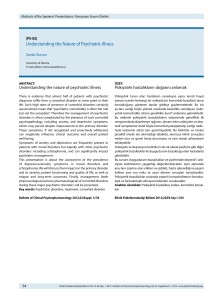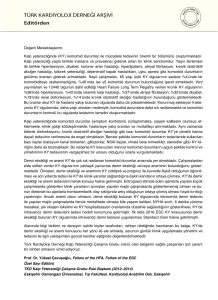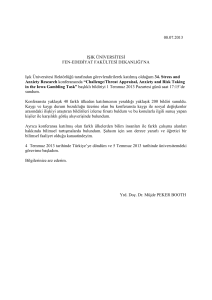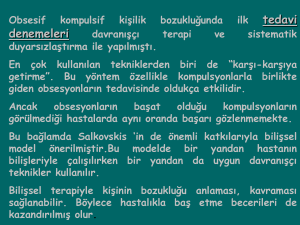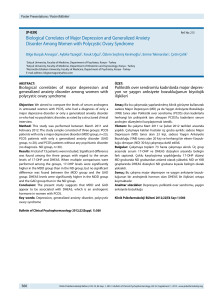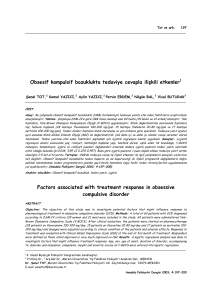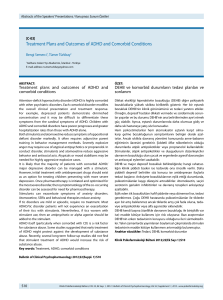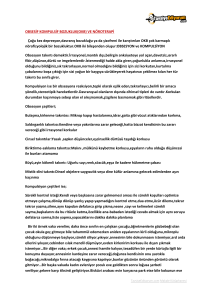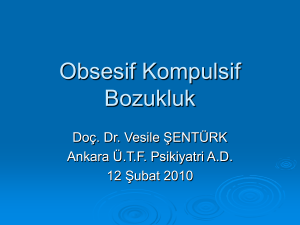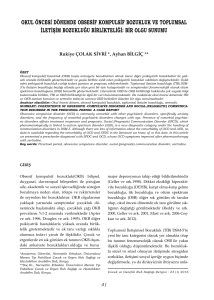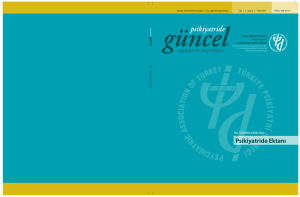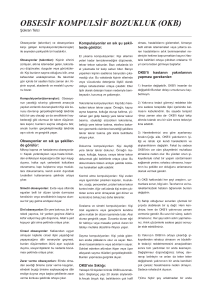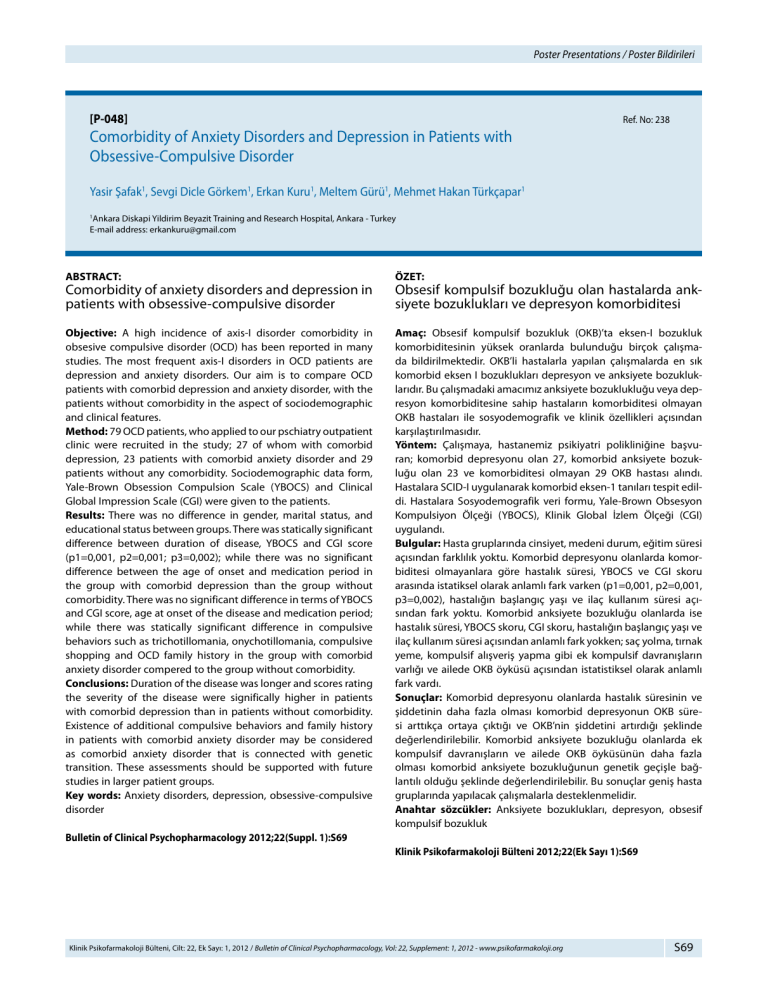
Poster Presentations / Poster Bildirileri
[P-048]
Ref. No: 238
Comorbidity of Anxiety Disorders and Depression in Patients with
Obsessive-Compulsive Disorder
Yasir Şafak1, Sevgi Dicle Görkem1, Erkan Kuru1, Meltem Gürü1, Mehmet Hakan Türkçapar1
1
Ankara Diskapi Yildirim Beyazit Training and Research Hospital, Ankara - Turkey
E-mail address: erkankuru@gmail.com
ABS­TRACT:
ÖZET:
Objective: A high incidence of axis-I disorder comorbidity in
obsesive compulsive disorder (OCD) has been reported in many
studies. The most frequent axis-I disorders in OCD patients are
depression and anxiety disorders. Our aim is to compare OCD
patients with comorbid depression and anxiety disorder, with the
patients without comorbidity in the aspect of sociodemographic
and clinical features.
Method: 79 OCD patients, who applied to our pschiatry outpatient
clinic were recruited in the study; 27 of whom with comorbid
depression, 23 patients with comorbid anxiety disorder and 29
patients without any comorbidity. Sociodemographic data form,
Yale-Brown Obsession Compulsion Scale (YBOCS) and Clinical
Global Impression Scale (CGI) were given to the patients.
Results: There was no difference in gender, marital status, and
educational status between groups. There was statically significant
difference between duration of disease, YBOCS and CGI score
(p1=0,001, p2=0,001; p3=0,002); while there was no significant
difference between the age of onset and medication period in
the group with comorbid depression than the group without
comorbidity. There was no significant difference in terms of YBOCS
and CGI score, age at onset of the disease and medication period;
while there was statically significant difference in compulsive
behaviors such as trichotillomania, onychotillomania, compulsive
shopping and OCD family history in the group with comorbid
anxiety disorder compered to the group without comorbidity.
Conclusions: Duration of the disease was longer and scores rating
the severity of the disease were significally higher in patients
with comorbid depression than in patients without comorbidity.
Existence of additional compulsive behaviors and family history
in patients with comorbid anxiety disorder may be considered
as comorbid anxiety disorder that is connected with genetic
transition. These assessments should be supported with future
studies in larger patient groups.
Key words: Anxiety disorders, depression, obsessive-compulsive
disorder
Amaç: Obsesif kompulsif bozukluk (OKB)’ta eksen-I bozukluk
komorbiditesinin yüksek oranlarda bulunduğu birçok çalışmada bildirilmektedir. OKB’li hastalarla yapılan çalışmalarda en sık
komorbid eksen I bozuklukları depresyon ve anksiyete bozukluklarıdır. Bu çalışmadaki amacımız anksiyete bozuklukluğu veya depresyon komorbiditesine sahip hastaların komorbiditesi olmayan
OKB hastaları ile sosyodemografik ve klinik özellikleri açısından
karşılaştırılmasıdır.
Yöntem: Çalışmaya, hastanemiz psikiyatri polikliniğine başvuran; komorbid depresyonu olan 27, komorbid anksiyete bozukluğu olan 23 ve komorbiditesi olmayan 29 OKB hastası alındı.
Hastalara SCID-I uygulanarak komorbid eksen-1 tanıları tespit edildi. Hastalara Sosyodemografik veri formu, Yale-Brown Obsesyon
Kompulsiyon Ölçeği (YBOCS), Klinik Global İzlem Ölçeği (CGI)
uygulandı.
Bulgular: Hasta gruplarında cinsiyet, medeni durum, eğitim süresi
açısından farklılık yoktu. Komorbid depresyonu olanlarda komorbiditesi olmayanlara göre hastalık süresi, YBOCS ve CGI skoru
arasında istatiksel olarak anlamlı fark varken (p1=0,001, p2=0,001,
p3=0,002), hastalığın başlangıç yaşı ve ilaç kullanım süresi açısından fark yoktu. Komorbid anksiyete bozukluğu olanlarda ise
hastalık süresi, YBOCS skoru, CGI skoru, hastalığın başlangıç yaşı ve
ilaç kullanım süresi açısından anlamlı fark yokken; saç yolma, tırnak
yeme, kompulsif alışveriş yapma gibi ek kompulsif davranışların
varlığı ve ailede OKB öyküsü açısından istatistiksel olarak anlamlı
fark vardı.
Sonuçlar: Komorbid depresyonu olanlarda hastalık süresinin ve
şiddetinin daha fazla olması komorbid depresyonun OKB süresi arttıkça ortaya çıktığı ve OKB’nin şiddetini artırdığı şeklinde
değerlendirilebilir. Komorbid anksiyete bozukluğu olanlarda ek
kompulsif davranışların ve ailede OKB öyküsünün daha fazla
olması komorbid anksiyete bozukluğunun genetik geçişle bağlantılı olduğu şeklinde değerlendirilebilir. Bu sonuçlar geniş hasta
gruplarında yapılacak çalışmalarla desteklenmelidir.
Anahtar sözcükler: Anksiyete bozuklukları, depresyon, obsesif
kompulsif bozukluk
Comorbidity of anxiety disorders and depression in
patients with obsessive-compulsive disorder
Obsesif kompulsif bozukluğu olan hastalarda anksiyete bozuklukları ve depresyon komorbiditesi
Bulletin of Clinical Psychopharmacology 2012;22(Suppl. 1):S69
Kli­nik Psikofarmakoloji Bülteni 2012;22(Ek Sayı 1):S69
Klinik Psikofarmakoloji Bülteni, Cilt: 22, Ek Sayı: 1, 2012 / Bulletin of Clinical Psychopharmacology, Vol: 22, Supplement: 1, 2012 - www.psikofarmakoloji.org
S69

